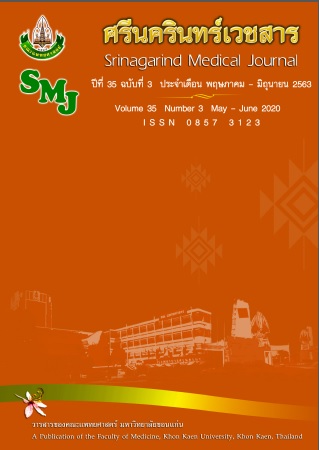Sleep Pattern among Students in Khon Kaen University
Keywords:
sleep patterns; college students; universityAbstract
Background and Objective: Undergraduate students have many changes in their life, which may affect the sleep patterns causing several health problems. This study aims to study the perception of problems and the sleep patterns of undergraduate students who attended Primary Care Unit 123 Khon Kaen University.
Methods: This study was a descriptive study. Population were the undergraduate students attending at Primary Care Unit 123 Khon Kaen University. The calculated sample size was 120. The samples were recruited by time frame allocation. The self-administered questionnaire information including demographic data, sleep information during the past 1 year and additional needs information about sleep problems. The results were analyzed by descriptive statistics and inferential statistics.
Results: Among 120 college students, most of them (47.5%, 95%CI: 38.38 - 56.78) thought that they had problems in sleeping. Most of them start sleeping at 0.00 - 2.00 a.m., awaking during 6.00 - 8.00 a.m., the number of hours of sleeping was more than 5 hours per day. In college students who thought that they had problems in sleeping, 52.6 percent spent more than 30 minutes for falling asleep, 29.8 percent into bed after 2:00 a.m. and 33.3 percent sleeping less than 5 hours per day.
Conclusion: Most of college students thought that they had trouble in sleeping. The college students who thought that they had problems in sleeping often had problems at the beginning of sleep and the number of sleeping hours in each day less than 5 hours. Therefore, caring of this such population should include screening and education of sleeping problems.
References
2. พูนศรี รังสีขจี. วงจรชีวิต: วัยผู้ใหญ่ตอนต้น-วัยชรา. ใน: นิรมล พัจนสุนทร, พูนศรี รังสีขจี, บรรณาธิการ. พฤติกรรมศาสตร์. พิมพ์ครั้งที่ 3. ขอนแก่น: ภาควิชาจิตเวชศาสตร์ คณะแพทยศาสตร์ มหาวิทยาลัยขอนแก่น; 2553. หน้า 13-26.
3. Kann L, Kinchen S, Shanklin SL, Flint KH, Kawkins J, Harris WA, et al. Youth risk behavior surveillance--United States, 2013. MMWR Suppl 2014; 63: 1-168.
4. Schneider LA, King DL, Delfabbro PH. Family factors in adolescent problematic Internet gaming: A systematic review. J Behav Addict 2017; 6: 321-33.
5. Lewinsohn PM, Clarke GN. Psychosocial treatments for adolescent depression. Clin Psychol Rev 1999; 19: 329-42.
6. Gonzaga GC, Keltner D, Londahl EA, Smith MD. Love and the commitment problem in romantic relations and friendship. J Pers Soc Psychol 2001; 81: 247-62.
7. Hammen C1, Brennan PA, Keenan-Miller D. Patterns of adolescent depression to age 20: the role of maternal depression and youth interpersonal dysfunction. J Abnorm Child Psychol 2008; 36: 1189-98.
8. Pizarro KW, Bustamante IV, Surkan PJ. Family Factors and Adolescent Problem Drinking in a High-Risk Urban Peruvian Neighborhood. Subst Use Misuse 2017; 52: 194-202.
9. Becker SP, Jarrett MA, Luebbe AM, Garner AA, Burns GL, Kofler MJ. Sleep in a large, multi-university sample of college students: sleep problem prevalence, sex differences, and mental health correlates. Sleep Health 2018; 4: 174-81.
10. ลัลลิยา ธรรมประธานกุล. ปัญหาการนอนในวัยรุ่น. ใน: รสวันต์ อารีมิตร, สุภิญญา อินอิว, บุญยิ่ง มานะบริบูรณ์, ศิริไชย หงษ์สงวนศรี, สมจิตร์ จารุรัตนศิริกุล, บรรณาธิการ. ตำราเวชศาสตร์วัยรุ่น. นนทบุรี: ห้างหุ้นส่วนจำกัดภาพพิมพ์; 2559: 443-54.
11. Tarokh L, Raffray T, Van Reen E, Carskadon MA. Physiology of normal sleep in adolescents. Adolesc Med State Art Rev 2010; 21: 401-17.
12. ผาณิตา ชนะมณี, สุนุตตรา ตะบูนพงศ์, ถนอมศรี อินทนนท์. คุณภาพการนอนหลับของนักศึกษามหาวิทยาลัย. สงขลานครินทร์เวชสาร 2549; 24: 163-73.
13. อรุณ จิรวัฒน์กุล. การเลือกตัวอย่างผู้ป่วยที่เข้ารับการรักษาในโรงพยาบาล ณ ช่วงเวลาที่กำหนด. ภาควิชาสถิติและประชากรศาสตร์ คณะสาธารณสุขศาสตร์ มหาวิทยาลัยขอนแก่น, 2547.
14. ปภิศา นิ่มอนงค์. การศึกษาความสัมพันธ์ระหว่างคุณภาพในการนอนหลับกับผลการเรียนและพฤติกรรมเสี่ยงของนักศึกษาแพทย์ คณะแพทยศาสตร์ศิริราชพยาบาล [อินเทอร์เน็ต]. กรุงเทพฯ: ภาควิชากุมารเวชศาสตร์ คณะแพทยศาสตร์ศิริราชพยาบาล; 2557 [เข้าถึงเมื่อ 18 ก.ค 2562]. เข้าถึงได้จาก: http://www.ped.si.mahidol.ac.th/thesis/image/5501009.pdf
15. ผาณิตา ชนะมณี, สุนุตตรา ตะบูนพงศ์, ถนอมศรี อินทนนท์. คุณภาพการนอนหลับและปัจจัยที่เกี่ยวข้องของนักศึกษามหาวิทยาลัยในภาคใต้. สงขลานครินทร์เวชสาร 2549; 24: 163-73.
16. Lund HG, Reider BD, Whiting AB, Prichard JR. Sleep patterns and predictors of disturbed sleep in a large population of college students. J Adolesc Health 2010; 46: 124-32.
17. Lack LC, Wright HR. Chronobiology of sleep in humans. Cell Mol Life Sci 2007; 64: 1205-15.
18. Drake C, Richardson G, Roehrs T, Scofield H, Roth T. Vulnerability to stress-related sleep disturbance and hyperarousal. Sleep 2004; 27: 285–91.
19. Jose PE, Ratcliffe V. Stressor frequency and perceived intensity as predictors of internalizing symptoms: gender and age differences in adolescence. N Z J Psychol 2004; 33: 145–54.
20. Buboltz WC Jr, Brown FC, Soper B. Sleep habits and patterns of college students: a preliminary study. J Am Coll Health 2001; 50: 131–5.
21. Kubota K, Shimazu A, Kawakami N, Takahashi M, Nakata A, Schaufeli WB. Association between workaholism and sleep problems among hospital nurses. Ind Health 2010; 48: 864-71.
22. Hazama GI, Inoue Y, Kojima K, Ueta T, Nakagome K. The prevalence of probable delayed-sleep-phase syndrome in students from junior high school to university in Tottori, Japan. Tohoku J Exp Med 2008; 216: 95-8.
23. นาฎนภา อารยะศิลปธร, พัชนี สมกำลัง, จรัสศรี สีลาวุธ, จันทร์จิรา ภูบุญเอิบ, จิราภรณ์ มุลเมืองแสน. ปัจจัยที่มีผลต่อคุณภาพการนอนหลับของนักศึกษาพยาบาลในวิทยาลัยพยาบาลแห่งหนึ่ง. วารสารวิทยาลัยพยาบาลพระปกเกล้า จันทบุรี 2560; 28: 38-50.
24. Steptoe A, Peacey V, Wardle J. Sleep duration and health in young adults. Arch Intern Med 2006; 166: 1689-92.




